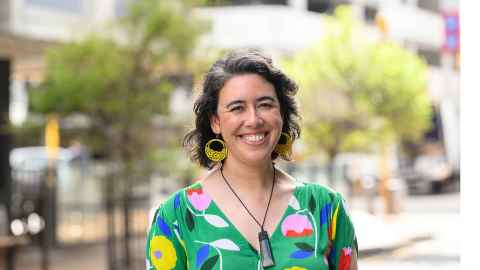Children’s Commissioner Claire Achmad wants young voices heard
24 May 2024
Dr Claire Achmad tells Janet McAllister we must create space for children’s voices – and listen to them.

What gets Chief Children’s Commissioner Dr Claire Achmad out of bed in the morning?
There’s doom and gloom, worry and injustice out there, as well as racism in schools, for example, as recently highlighted by Mana Mokopuna, the Children and Young People’s Commission.
So, just asking for a hypothetical friend who may or may not be hypothetically despairing: what keeps Claire motivated?
Claire is typically upbeat and approachable (a boon in her job). But even so, her answer is surprisingly positive: her motivation is not just having hope for good change. It is that she is already seeing communities, including children, creating it.
She cites, as an example, the kaupapa Māori transitional housing run by Mā Te Huruhuru charitable trust in Auckland. It’s for mokopuna Māori who have had “really tough experiences: trauma and poverty, homelessness, experiences in the criminal justice system, the care and protection system”.
In 2023, Claire shared time with these young people who she says get the “empowering experience” of living in their own home, and the chance to heal from their trauma and learn about their whakapapa and culture.
“Several said to me, ‘For so long we felt we couldn’t even have dreams and hopes for the future’. And through the support they’re getting, they realise they can have dreams – and they do have dreams for their future.”
That’s success, thanks to community manaakitanga, leadership and knowledge.
Claire has dedicated her career to advocating for children’s rights and, working with others, she has had several wins. Satisfyingly, European governments stopped their “harsh” policies of forcibly returning unaccompanied-minor asylum seekers back to dangerous situations. This came a few years after Claire, working for UNICEF in the Netherlands, assisted refugee children from Afghanistan, Iraq and elsewhere to share their stories to create change.
Children have very powerful and important voices that we all need to listen to.
Now, as then, “It’s partly my role to let children and young people know I’m listening to them. I value what they’re sharing with me to encourage them to speak up,” she says.
“Too often children aren’t getting those signals from society that they really do matter, and it’s their right to participate in things that affect them. They have very powerful and important voices that we all need to listen to.”
Claire grew up in a “loving home with amazing parents and incredible grandparents” in the idyllic Waitākere Ranges, surrounded by kererū and kauri trees.
“That is the place where I feel most at home and most deeply connected to,” she says, crediting her teachers at Titirangi Primary, Glen Eden Intermediate and Avondale College (where she was head girl) for opening her eyes to social justice. Family, friends and ngahere – native forest – remain her rejuvenating touchstones.
During Claire’s childhood, her Pākehā mum Robin taught in the University’s Asian Languages department, then worked as a school library manager. Her Javanese dad, Bambang, led quality control for Bic manufacturing.
“We’ve been back a few times to Indonesia to see family. I’m very fortunate to walk in two worlds,” says Claire, who is part of the Asia New Zealand Foundation leadership network.
During her Law and Arts conjoint degree, she helped set up the Law School’s Equal Justice Project in 2005, a student-run volunteer organisation that increases youth awareness of legal rights (through high school presentations) and supports individual cases in Community Law Centres.
Claire initially led refugee and migrant advocacy, before becoming co-director in the organisation’s second year. “I got to apply my classroom learning in the real world, and experienced the real change you can help to create in people's lives, while still at university. So that was fantastic.”
She went on exchange to the University of Copenhagen to immerse herself in international human rights law studies, and later graduated with a PhD from Leiden University in 2018. She undertook her PhD on the topic of children's rights in international commercial surrogacy, in between advocacy stints at the Human Rights Commission, World Vision in Melbourne, and Barnardos Aotearoa, before leading Social Service Providers Te Pai Ora o Aotearoa.
She became Chief Children’s Commissioner in November 2023 – the same year the Office of the Children’s Commissioner became Mana Mokopuna, the Children and Young People’s Commission, which is led by a board of commissioners, chaired by Claire. (The new government, however, has since indicated this structure will likely change.)
She follows other University alumni as children’s commissioners: Justice Andrew Becroft (2016-21) and Dame Cindy Kiro (2003-2008), who became the University’s Pro-Vice Chancellor (Māori) and then Governor-General.
The principles remain the same, says Claire. “Every child and young person in this country has rights under the UN Convention on the Rights of the Child; every mokopuna Māori has rights under Te Tiriti o Waitangi. These are the things we are standing up for.”
So, for example, the Mana Mokopuna report sharing children’s accounts of racism also shares their ideas about how to end it. In their own words, mokopuna tell us “action is essential”.
It’s a wero laid down for us all.
This is an extended version of a story that first appeared in the Autumn 2024 edition of Ingenio.